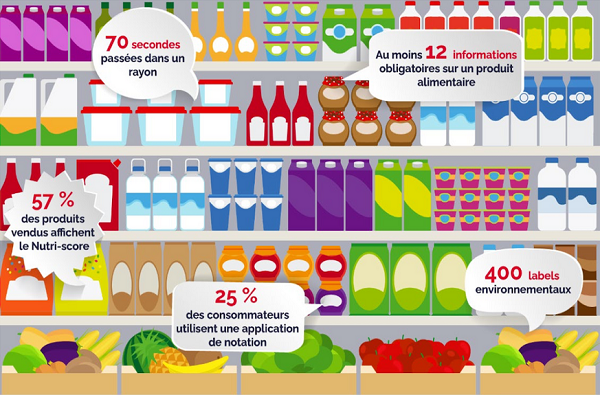Why, when they have never obtained so much detailed information on the products they buy, are consumers becoming more and more perplexed, or even suspicious, of this effort at transparency?
The report from the Senate's Economic Affairs Committee, published on June 29, highlights a problem with the legibility and reliability of information, particularly optional information (labels, value-adding mentions, claims, etc.). While this profusion of information is a source of confusion, the public resources dedicated to monitoring are in free fall. However, the information to be monitored is increasingly abundant (environmental display, sustainability index, optional dematerialized information in QR codes, etc.).

In this context, simplified displays are particularly relevant, such as the Nutri-Score, which the authors of the report call for anticipating the generalization at European level in 2023. Similarly, rating applications have contributed to making information more synthetic and therefore more readable, but the authors insist on the need to make their operation more transparent.
The senators have therefore highlighted a dozen recommended best practices for supervising these applications and encouraging their development. The report also suggests that the public authorities certify them, to attest to the relevance of the evaluation criteria about science, and the reliability of the databases used.
The report also recommends a reinforced framework for certain misleading claims and commercial practices, as well as a reinforcement of the means of the DGCCRF and consumer associations. Finally, the report reminds us that consumer protection policy depends first and foremost on education, which allows consumers to assimilate this information.
For Sophie Primas, President of the Commission, "too little work has been done on the question of how the information provided by manufacturers is processed by consumers. However, information that is misunderstood or not taken seriously can be counterproductive if it discredits other information. This report notes this issue and will help increase the impact of the transparency movement we are all calling for.
For Fabien Gay, the draftsman, "our work explores several avenues for improving consumer information. One of them, in particular, seems to be fundamental in my opinion: consumer education, at school, and throughout life. Being a consumer requires knowledge: when it comes to food, we need to give consumers the keys to make informed choices about their products, which means being aware of nutrition, taste, quality, and traceability issues.
For Françoise Férat, draftswoman, "a striking example shows the illegibility of the information provided to consumers: the origin of products. The rules differ so much from one product to another that consumers do not understand them, and develop a sense of suspicion. We recommend several ways to harmonize and extend, once and for all, the display of the origin to all food products".
For Florence Blatrix Contat, spokesperson, "there is no doubt that the future of consumer information will involve dematerialization, particularly QR codes. The latter will make it possible to personalize information, whereas today it is the same for all consumers, and therefore to better meet people's expectations. In addition, great progress in terms of traceability will be made thanks to them.
Information report (in French) is available here.
List of the 17 recommendations (in French).
Source : senat.fr
